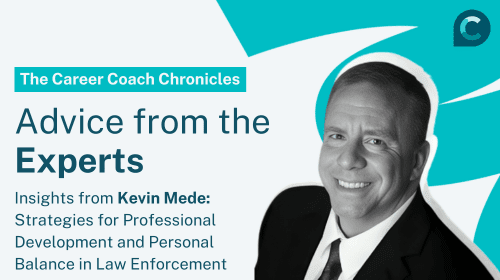Key Takeaways
- Reflect on your motivations and goals for joining law enforcement to ground your career.
- Protect your personal time by not engaging with work during off hours to prevent burnout.
- Cultivate a broad professional network, including veteran officers and civilian staff, for support and guidance.
- Volunteer for unique roles and community engagement opportunities to stand out for promotions.
- Regardless of rank, invest time in leadership books and seek mentorship to prepare for future roles.
- Maintain hobbies and personal relationships to ensure a well-rounded life outside of law enforcement.
Building a Foundation in Law Enforcement
In our chat with Kevin Mede, we dive into what it really takes to thrive in law enforcement. From rookies just starting out to veterans on the force, Kevin gives the lowdown on handling the tough stuff: staying resilient, building a strong support system, and keeping your head in the game while also enjoying life outside the badge. Whether you’re new to the beat or have been walking it for years, these tips are about making the job work for you, staying sharp, and not losing sight of the things that matter.
What mental preparation techniques should rookies focus on before starting their law enforcement careers to handle emotional challenges effectively?

“As far as mental preparation, starting with a solid foundation of who they are as an individual would be ideal. Truly answer the questions of why they want to be in law enforcement and what they expect to accomplish. Often rookies are disillusioned by the expectations vs reality conflict after a short time on the job when they have an ideal of saving the world which is met with, at times, a sense of powerlessness to effect meaningful change on a bigger level.”
.
Early in their careers, how can officers develop resilience strategies to cope with stress and avoid burnout?
“At first this career can be all consuming. You wonder what is going on with your agency when you are off and you cancel vacations to cover shortages or work an extra overtime gig during your time off.
Establishing healthy boundaries before the job starts is important; for example, commit to not checking your work email and work phone during your time off. Be protective of your time away as it is important for you to be able to recharge and regroup – even if you don’t ‘feel’ like you need to at that time. Stress is cumulative and minimizing it before you feel it pressing down on you is helpful.”
For officers just beginning, what are the best ways to build a supportive professional network within the law enforcement community?
“A supportive professional network consists of more than just other peers. I would seek out veteran officers, supervisors, command staff and other roles such as dispatchers and civilian support personnel who have been around and are respected by the majority. There is a lot to learn from those who have gone before you. Many times, new people will be drawn to the ‘no nonsense’ Sgt who skirts the policies and tells new hires he is ‘taking care of them’ by not holding anyone accountable. Following that lead, or in those footsteps, does not lead to a professional, sustainable career.”
Achieving Professional Excellence
As officers settle into their roles, what signs indicate they’re ready for more responsibility or specialization?
“When officers find themselves on scene or listening to a call in another beat/jurisdiction and they begin to imagine how they would run the scene. Another sign is when people of higher rank seek that officer out and encourage them to promote. They might not ‘feel’ ready, but when supervisors seek out someone who they believe has the skills and mindset, they do so knowing the requirements and expectations of the position.”
What unconventional learning experiences or professional development opportunities can help officers stand out for promotion?
“Occasionally, agencies will ask around to have role players take part in their promotional assessment process. If you want a good idea of understanding at least one aspect of the process, volunteer to assist.
If there is an opportunity to speak at a community event, volunteer for it. It will force you to make sure you understand the topic and what kind of questions/concerns your specific community has.”
How can officers cultivate leadership qualities even if they’re not in a leadership position, preparing for future roles?
“I believe leaders are readers. Regardless of your rank, everyone can better themselves for a very minimal investment of money and time. There are numerous easy to read, time-tested leadership books that relate directly to law enforcement. I would suggest they ask the people they’ve identified as mentors.”
Sustaining Personal Well-being
After establishing their careers, what practices should officers incorporate to maintain mental health and manage the pressures of the job?
“REACH OUT. Use the resources available to you. EAP, employee wellness programs etc. Use your sick time when you don’t feel well! You may feel like you are doing someone a solid by coming in sick, but you are compromised. You are choosing the very short time ‘win’ (squad doesn’t have to go short or call someone in on OT) for a longer term ‘loss’ (you get more run down, feel worse, burnt out).
Continue to do the things you enjoyed before you became a cop… don’t get stuck in the ‘usta’s’…I usta ski, I usta golf, I usta…try and keep a balance between the things that bring you joy/stress relief and this job.”
What strategies can seasoned officers employ to ensure their personal relationships thrive despite the demands of their profession?
“Again, boundaries. If you are on your time off, be off. If you are subject to call out, ensure that you set aside special dates/activities and notify the TL that you are NOT available during that time. This is, after all, a job. A very important one, but a job nonetheless.
Communicate. I think the biggest stressors in relationships are unspoken expectations. If we try our best to clearly communicate with each other in a respectful way everyone comes out ahead. Unspoken expectations lead to bitterness and resentment when our expectations aren’t met, even though the other person may have no idea what we are upset about.”
How do hobbies or creative outlets contribute to a balanced life for officers deeply embedded in their careers?
“This is a job. No one will lay on their deathbed at the end of their life and think “I wish I would have worked a few more shifts!” The hobbies and creative outlets we need to each embrace make life worth living. Law Enforcement is a noble profession and a very serious one. If we don’t balance life out by doing things that refill our tank that are completely separate from law enforcement, life will become too one-dimensional. Remember, no matter how long you are on the job, one day you will retire. You want to have more to sustain you and fulfill you than cop stories of the ‘good ol’ days’.”
#Kevin #Medes #Guide #Law #Enforcement #Success



